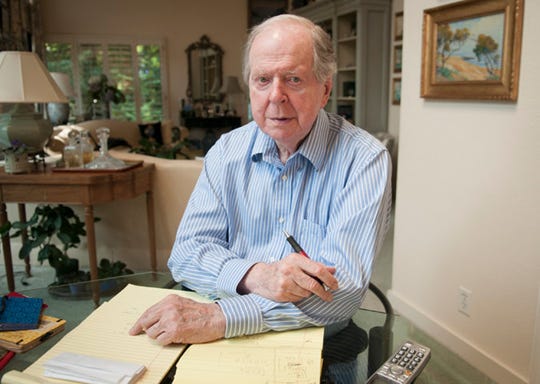Obituary: Robert Conquest
To be denounced by the U.S.S.R. as “anti-Sovietchik No. 1” is to have lived well.
This article was published on my old blog before I started with Substack.
Few men did more than the historian Robert Conquest to refute the lies of the Soviet Union, undermining its ideology and propaganda, therefore its appeal, and ultimately its regime. Indeed, at the final meeting of the Soviet Central Committee a Stalinist hack described Conquest as “anti-Sovietchik No. 1”; a compliment if ever there was one.
Born in 1917 in Worcestershire, Conquest would—like many in the intelligentsia of his generation—fell for Communism in the 1930s. Conquest was an open member of the Communist Party of Great Britain—he had been radicalized especially by the Spanish Civil War—but reacted sharply against the certainty and orthodoxy of the Communists.
Conquest served in the British army during the Second World War, and was in Bulgaria when Stalin’s Red Army invaded in September 1944. Conquest was a British diplomat for a few years after the war and then went on to the scholarly work that will remain his legacy.
Conquest’s The Great Terror (1968) about the Moscow Trials and The Harvest of Sorrow (1986) about the Ukrainian terror-famine (the Holodomor) were well ahead of their time.
To the very end Communists, their sympathizers, and Soviet agents would make equivalences between the McCarthy hearings—at which nobody was killed—and the Soviet show trials, which between 1937 and 1938 arrested seven million people and liquidated one million, at the same time that two million more were worked or starved to death in the GULAG. Conquest—like many serious anti-Communists (especially those who were ex-Communists like himself and Whittaker Chambers)—denounced Senator McCarthy as handing a needless propaganda victory to the Soviet Union.
The denial of what happened in Ukraine continues to this day. Some apologists allow that atrocities were committed in the course of forced collectivization, but they deny that these were genocidal crimes, claiming that Stalin acted against kulaks, a class, rather than Ukrainians as a people.
Conquest’s estimate that Stalin killed twenty million people—in the purges, slave labour camps, and famines—was among the things that had him so reviled by Communists and fellow travellers, whose great claim for the Soviet Union after its crimes began to be exposed was that at least the Red Army had defeated Hitler. To find that Stalin had murdered more innocent people Hitler destroyed in the Holocaust was something the comrades had difficulty weaving into this narrative.
The story that Conquest, asked to re-issue The Great Terror under a new title after the fall of the Soviet Union when everyone finally had to admit he had been right, suggested, “I Told You So, You Fucking Fools,” is, sadly, apocryphal; it was his friend Kingsley Amis that suggested this.
Conquest had a lighter side, too, writing novels and poetry. The planned collection of limericks alas never materialized but Christopher Hitchens records some of Conquests greats, including:
There was an old bastard named Lenin / Who did two or three million men in / That’s a lot to have done in / But where he did one in / That old bastard Stalin did ten in.
Conquest’s politics after his Communist period were largely social democratic. Conquest’s friendship with Margaret Thatcher—it was after consultation with him that Mrs. Thatcher gave the “Iron Lady speech”—signalled a slight rightward drift in later years, but it is noteworthy that, for example, Conquest had supported the American position in Vietnam when he was still sternly on the Left. Conquest was an early sceptic of the European Union and concluded in later life that the Anglosphere should form a more organized alliance.
Robert Conquest’s life offers many lasting lessons, primary among them that areas under tyranny will eventually be free and the tyrants’ apologists in the Free World will have to answer for what they said and wrote while the regimes lasted. This is obviously a particularly acute lesson for the Middle East.
Bernard Lewis once put it this way:
After the fall of the Soviet Union, the [historians] who were denounced as enemies were welcomed in Russia … Those who were previously praised as good friends of the Soviets were dismissed with contempt as either hirelings or dupes of the Soviets.
Those who now use references to the “historic process” and “Orientalism” to explain why tyrants in the Greater Middle East cannot be criticized—or not criticized by Westerners, anyway—will not be thanked when the populations are eventually free of these wretched regimes.
The struggle goes on. There are those who tell us Bashar al-Assad—despite using fighter jets against cities, gassing civilians, instituting terror-famines, and allowing the rise of the Islamic State to discredit the rebellion—is the answer to Syria’s woes, rather than their fons et origo. Others—with a considerable overlap—imagine that giving billions of dollars to the Islamic Republic of Iran means the regime will moderate and provide jobs for its people, rather than export more terrorism.
Conquest had the solution to this lack of clarity about tyranny. Forget the old Left/Right antagonism, said Conquest; what we really need is a United Front Against Bullshit.


